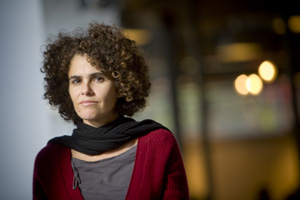Karina Skvirsky was 10 years old when her father handed her a plastic camera and told her to take pictures of Guayaquil, Ecuador, where the family was living for a year.

Karina Skvirsky
“He wanted me to photograph Guayaquil as a Third World country,” Skvirsky, assistant professor of art, says of her American-born Jewish father. “But it was our home.”
It was an odd assignment for a child, but Skvirsky did as she was told snapping photos of an overcrowded bus, holes filled with sewage on the sidewalk, and piles of trash. In one shot, she posed her father and 3-year-old sister in front of a homeless family sleeping on the street.
“I didn’t get it. I wasn’t critical of my father’s “assignment” at the time,” of the project, she says. “But I have photos that make no sense as a 10-year-old.”
Years later, after having a child of her own and then watching, “Memories of Underdevelopment,” a Cuban film that deals with race, poverty, and colonialism in the sense that foreign is superior, Skvirsky was inspired to revisit her childhood memories of Ecuador but through the lens of adulthood. She was particularly interested in discovering how this experience shaped her identity as a child of an Ecuadorian mother and white father.
“I really connected with this other part of me,” says Skvirsky, who has reproduced the 16 photos from her scrapbook for an international exhibition at the 29th Sao Paulo Art Biennial in Brazil in September.For the exhibit, called, “My Pictures from Ecuador,” Skvirsky added captions, scrawled in the hand and voice of her former 10-year-old self, as a way to narrate her personal story.
“They are very poor and do not have a house,” she wrote next to the photo of the homeless family. The straight forwardness of the text offers not only insight into the innocence of the child taking the photo but is a commentary on social class and the economic situation of the city at the time.
It’s an approach she employs in the classroom encouraging students to use photography as a commentary on race, class and social issues.
“Photography isn’t one thing, it’s not just about snapshots,” she says. “I want my students to look at photographs in a critical and theoretical way and question the images that they may take for granted in our media-saturated society. ”
Skvirsky’s work was featured in three exhibits last semester. Her art book, “The End is Near but I don’t want to go,” was part of the Narrative Sequences show at the Center for Book Arts in New York City. The five-panel book explores her fears an apocalypse caused by global warming.She also exhibited photos at the Elizabeth Foundation for the Arts Project Space in New York City and at la EX CULPABLE in Lima, Peru.
